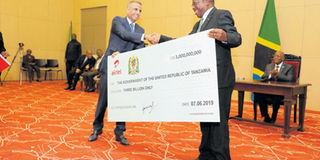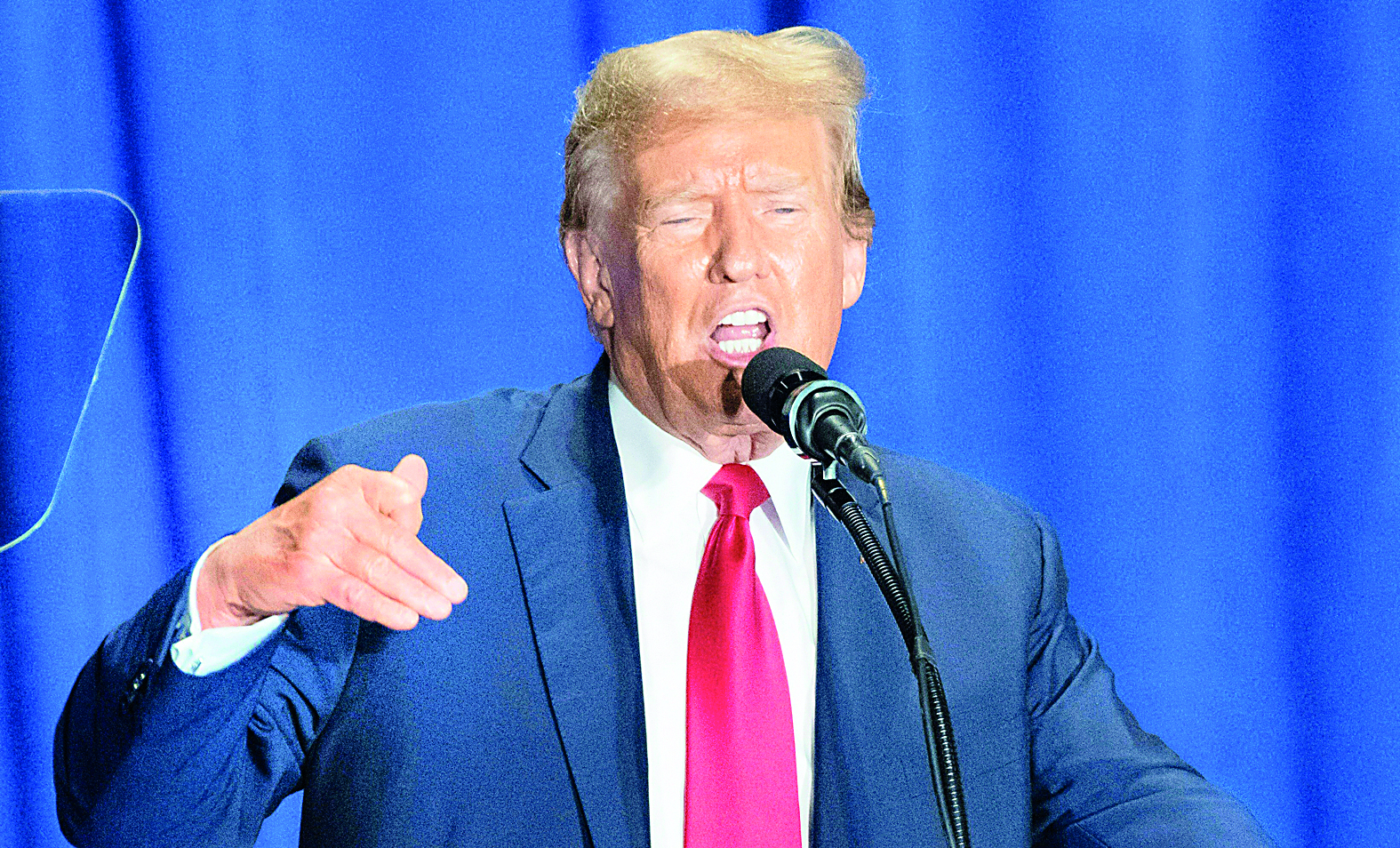Magufuli, Airtel boss speak of hard bargained deal

President John Magufuli looks on as Finance and Planning minister Philip Mpango receives a symbolic cheque for Sh3 billion from Bharti Airtel chairman Sunil Mittal at State House, Dar es Salaam, yesterday. The cash is compensation to the government after the two sides reached an agreement to settle a dispute over the ownership of Airtel Tanzania earlier this year. PHOTO | STATE HOUSE.
What you need to know:
- President Magufuli and Mr Mittal, who spoke at the State House in Dar es Salaam yesterday, talked of the pressure from both sides to reach an agreement following a shareholding and profit sharing dispute.
Dar es Salaam. President John Magufuli and Bharti Airtel boss Sunil Mittal have shed light into what they both described as tough negotiations for the ownership of the telecoms company, trading locally as Airtel Tanzania Limited.
President Magufuli and Mr Mittal, who spoke at the State House in Dar es Salaam yesterday, talked of the pressure from both sides to reach an agreement following a shareholding and profit sharing dispute.
The two parties eventually struck a deal for a mutually beneficial engagement whose endorsement came with a Sh5.27 billion paycheck to the government yesterday. President Magufuli announced the State will now own a 49 per cent stake in Airtel Tanzania.
In December 2017, President Magufuli ordered an investigation into what he said was irregular switching of government shares in Celtel Tanzania in 2001.
Celtel was jointly owned by Tanzania Telecommunications Company Limited (TTCL) and was later rebranded Airtel Tanzania.
The government forced Airtel into negotiations after it threatened a takeover to recover its accrued benefits. Proponents of the TTCL takeover of Airtel argued that Tanzania was “shortchanged at the altar of corruption”, and that the government’s investment in Celtel wasn’t commensurate with the returns over the years.
Finer details of the negotiations were not made public, but both parties expressed confidence in the business going forward, with Mr Mittal noting that corporate accountability and government responsiveness to interests of the private sector remains critical.
“You directed us to finalise each and everything within a month and was amazed how fast the job was done. I am delighted you emphasised that both interests of the governments and investors should be protected,” said Mr Mittal.
Development projects
Dr Magufuli said benefits from the deal would enable implementation of various development projects.
The money paid out included $1 million (Sh2.3 billion) in goodwill and Sh3 billion, being 1 billion monthly contribution each for April, May and June. Airtel will pay up to Sh60 billion over the next five years.
Tanzania will also hold three slots in the company’s board of directors and also appoint part of the top management. Airtel will also pay the government dividends equal to 19 years of its operations and write off Sh459 billion, reportedly in government debts.
“I salute the country’s negotiation team and commend Mr Mittal for believing in the talks instead of seeking international arbitration,” said President Magufuli, adding that he would have deregistered the company if it followed that route.
The President said now that the parties have resolved the dispute, he will give his full support to Airtel. He told Mr Mittal to ensure remaining issues were sorted out before leaving.
Foreign Affairs minister Palamagamba Kabudi, who led the Tanzanian team in the negotiations, said a deal was struck after five rounds of talks.
International tribunals
“This sends a message that investment disputes can be resolved domestically without engaging the international tribunals,” he said. Tanzania has passed a law restricting investment disputes to a local resolution mechanism.
In another development, Dr Magufuli revealed why he sacked Industry and Trade minister Joseph Kakunda and demoted Tanzania Revenue Authority (TRA) commissioner general Charles Kicheere.
Speaking during the event, he said Mr Kakunda failed to supervise the docket, including addressing challenges facing traders and source for market of more the 200,000 tonnes of government-owned raw cashew nuts.
“Why should traders wait for my meeting, while there is the minister who could visit the regions and have audience with them?” he asked.
President Magufuli said he considered sacking all senior officials in the ministry, including the minister, deputy minister, permanent secretary and his deputy.
“You would also have been sacked Mr Mhede (the new TRA commissioner general) because you served in the ministry as deputy permanent secretary.”
Stagnated revenue collection, diversion of transit good into local market by some traders and failure to control unscrupulous TRA officers at some borders including Tunduma and Sirari contributed to sacking of the former TRA boss, the Head of State said.



